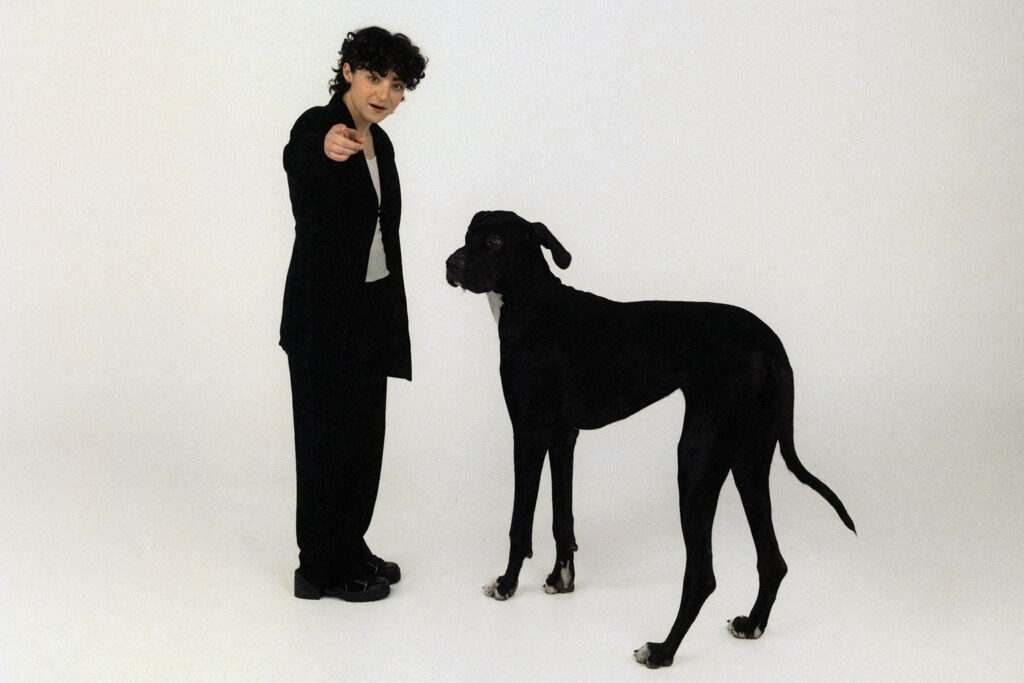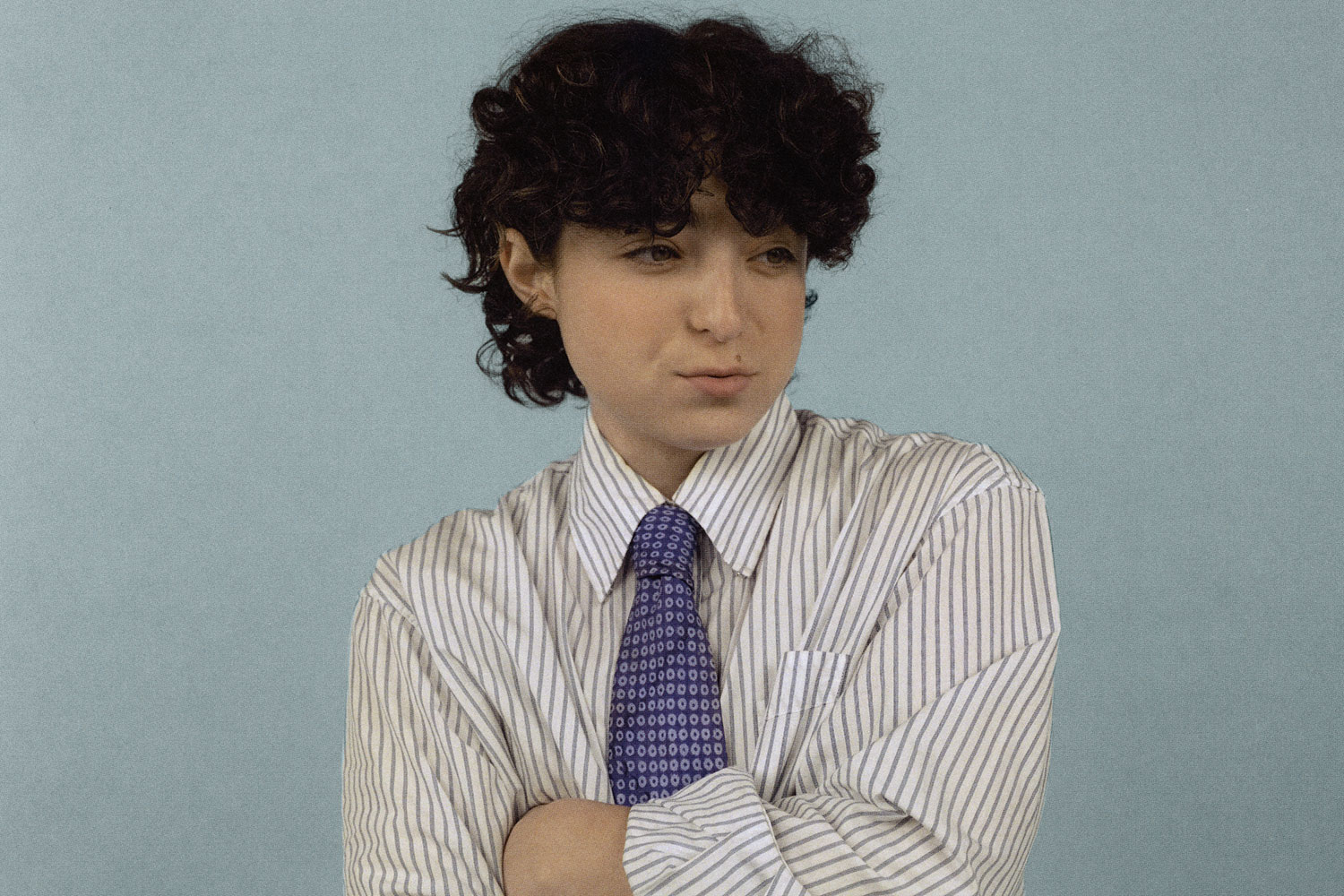It’s fitting that Supermodels, Claud’s sophomore album, leaves listeners with the parting words, “I’ve been thinking about moving out of New York.” Supermodels is a nomadic album in many senses: it wanders between genres, ideas, and even physical places — the “bones of the songs” were assembled in Claud’s Brooklyn apartment and studio, but parts of the record were written, produced, and performed across locations. And like any nomad, Claud doesn’t know where they’ll land next.
Claud has been particularly nomadic over the past two years, testing new material on tour while supporting the likes of Paramore, Bleachers, and boygenius. They were also developing Supermodels in Los Angeles and while visiting their father in Chicago. “I took it with me wherever I went,” Claud says. “I didn’t really subscribe to the process of going to one location and making my album.”
In the same closing song, “Screwdriver,” Claud sings, “Sometimes I feel like getting married, sometimes it’s all a dream.” This comes one track after their confession, “sometimes I think it’s all over…when it’s not.” The last moments of Supermodels leave enough space to start questioning the future.
“I wish I could hug the person who I was when I wrote that — it’s so self-deprecating and self-loathing, but it also has so much hope and pondering,” Claud says. “I loved the idea of leaving the album unfinished or open-ended, like I still don’t have the answers.”
Even though Claud now calls Brooklyn home, the footprints leading up to their artistic journey remain planted in Chicago, including some on the tile floor of their grandfather’s cafeteria-style restaurant, Ronny’s Steakhouse (which closed in 2020). The Highland Park-born singer-songwriter was raised by dinners at the 57-year downtown fixture, along with the drag queens and queer elders at Berlin in Lake View, and the sounds of Midwestern alt-rock mainstays — Semisonic, Sheryl Crow, The Smashing Pumpkins. “I loved the lore that Billy Corgan lives in Highland Park,” Claud says, giving the artist a Boo Radley quality. “I still have never seen him in the flesh. To this day, I’m like, ‘Is he a ghost? Is he actually there?'”

In 2017, they left for Syracuse University, playing house shows and releasing a self-titled EP with Josh Mehling as “Toast.” After the duo gained a considerable following within two years, traveling with The Marías and girl in red, Claud dropped out of school to pursue music full-time. Sideline Star, their first solo EP, caught the ear of Phoebe Bridgers (“by the grace of God,” as they put it), who sought Claud’s signature for over a year, making them the first artist rostered under Bridgers’s label, Saddest Factory Records. A debut album recorded at Electric Lady Studios, Super Monster, was released three months later. It earned a glowing review from NME, which dubbed it “a vivid portrait of the giddiness and drama of love.” Vogue named the single “Soft Spot” among its list of the best songs of 2021.
Supermodels, Claud’s following project, was conceived on a weathered guitar and second-hand piano with missing octaves, both questionably tuned. From those off-kilter instruments, however, came a dynamic, 13-entry musical diary, injected with humor and reflectiveness. The songs’ thematic variance bring a range of styles, yet one voice remains constant. “I feel the most free as an artist when I’m not trying to fit into one sound,” Claud says. “I like when something sounds like a collage of genre.”
They considered about 50 songs for the LP, whittling down to a combination of tracks that felt like episodic journal entries. For each of the themes — growth, fracturing relationships, uncertainty — on the final record, there might be as many that never escaped the studio. Although she didn’t work on the songs, Bridgers also gave feedback on her favorites and the ones she found especially moving.
There’s melodic parts of Supermodels, such as the dreamy, indie pop-ish “Climbing Trees,” co-written with — and in the style of — Brad Hale of Now, Now. But there are also cuts that were destined to light up large crowds, written with live performance in mind. After Claud brought a voice memo to fellow singer-songwriter/co-writer Ethan Gruska that would eventually become “Glass Wall,” Gruska asked how they wanted it to be produced.
“This is a furious, frustrated rock song,” Claud remembers responding. “I can’t see it any other way.”
The simple guitar and bleak opening lyrics of “The Moving On” establish expectations for something you’d hear at an open mic. About a minute in, however, it morphs into a windows-down anthem. The third chorus might be the most emphatic Supermodels gets. Yet neither section feels out of character.
Meanwhile, the acoustic moments are like narrative checkpoints scattered throughout the tracklist. On the opening song, “Crumbs,” the stripped-back instrumentation sets the stage for a calm domestic scene, with hints suggesting something else to come later. The layered vocals and trailing hums draw a parallel with Clairo, Claud’s bandmate in the currently dormant Shelly (and a former Syracuse classmate). By the time listeners reach “Spare Tire,” a melancholy flashback from a matured perspective, there’s an apparent sense of how much has changed.
Claud also flexed different creative muscles for the lead single’s video. Early in the pandemic, they reached out to comedian and Second City alum Grace Kuhlenschmidt, noticing a Windy City reference in one of Kuhlenschmidt’s TikToks. Both New York-based, they became quick friends. They collaborated on the music video for “Every Fucking Time,” Claud’s first time in the director’s chair.
Making Supermodels was a surreal experience in many ways, including a music video cameo from Paul Rudd (track No. 8’s namesake) after crossing paths at a Taylor Swift concert. Working alongside Semisonic’s Dan Wilson, an “encyclopedia of knowledge,” was another highlight. “It took us so long to write together, every 10 minutes I asked him some huge life question,” Claud says. “He’s lived 1,000 lives.”
Five years removed from their first EP, Claud feels conflicted about the term “bedroom pop,” a label often thrust upon them and their peers who started in the mid-2010s. “That was a beautiful time, but I think that also turned into something a little diminishing of the artists,” Claud says. Supermodels, after all, wasn’t made in a bedroom — it came to life in a studio, with an arsenal of musicians and producers. “I like it as an endearing term to commemorate the time I started my artist project, I just wouldn’t use it to describe the album I just made.”
That’s not to say the album is unrecognizable from someone who was once one-half of Toast, but its sound roams far beyond the SoundCloud days. “The world of genre is really flexible,” Claud says. “It’s always limiting to confine myself to one space.”



